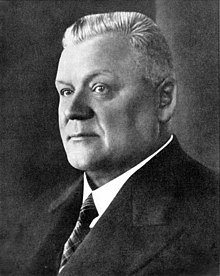Karlis Ulmanis
| Kārlis Ulmanis | |
|---|---|
 |
|
| Prime Minister of Latvia | |
|
In office November 19, 1918 – June 18, 1921 |
|
| President | Jānis Čakste |
| Preceded by | Position established |
| Succeeded by | Zigfrīds Anna Meierovics |
|
In office December 24, 1925 – May 6, 1926 |
|
| President | Jānis Čakste |
| Preceded by | Hugo Celmiņš |
| Succeeded by | Arturs Alberings |
|
In office March 27, 1931 – December 5, 1931 |
|
| President | Alberts Kviesis |
| Preceded by | Hugo Celmiņš |
| Succeeded by | Marģers Skujenieks |
|
In office March 17, 1934 – June 17, 1940 |
|
| President | Alberts Kviesis Himself |
| Preceded by | Ādolfs Bļodnieks |
| Succeeded by | Augusts Kirhenšteins |
| 4th President of Latvia* | |
|
In office April 11, 1936 – July 21, 1940 |
|
| Prime Minister | Himself Augusts Kirhenšteins |
| Preceded by | Alberts Kviesis |
| Succeeded by | Augusts Kirhenšteins as Prime minister |
| Foreign Minister of Latvia | |
|
In office May 4, 1926 – December 17, 1926 |
|
| Prime Minister | Arturs Alberings |
| Preceded by | Hermanis Albats (Acting) |
| Succeeded by | Felikss Cielēns |
|
In office March 24, 1931 – December 4, 1931 |
|
| Prime Minister | Himself |
| Preceded by | Hugo Celmiņš |
| Succeeded by | Kārlis Zariņš |
|
In office March 17, 1934 – April 17, 1936 |
|
| Prime Minister | Himself |
| Preceded by | Voldemārs Salnais |
| Succeeded by | Vilhelms Munters |
| Personal details | |
| Born |
September 4, 1877 Bērze, Courland Governorate, Russian Empire (now Latvia) |
| Died | September 20, 1942 (aged 65) Krasnovodsk, Soviet Union (now Türkmenbaşy, Turkmenistan) |
| Nationality | Latvian |
| Political party | Latvian Farmers' Union (1917–1934) |
| Alma mater | University of Nebraska-Lincoln |
| Signature | |
| *Self-proclaimed | |
Kārlis Augusts Vilhelms Ulmanis (September 4, 1877 in Bērze, Bērze Parish, Courland Governorate, Russian Empire – September 20, 1942 in Krasnovodsk prison, Soviet Union, now Türkmenbaşy, Turkmenistan) was one of the most prominent Latvian politicians of pre-World War II Latvia during the interwar period of independence from November 1918 to June 1940. The legacy of his dictatorship still divides public opinion in Latvia.
Born in a prosperous farming family, Ulmanis studied agriculture at the Swiss Federal Institute of Technology Zurich and at Leipzig University. He then worked in Latvia as a writer, lecturer, and manager in agricultural positions. He was politically active during the 1905 Revolution, was briefly imprisoned in Pskov, and subsequently fled Latvia to avoid incarceration by the Russian authorities. During this period of exile, Ulmanis studied at the University of Nebraska–Lincoln in the United States, earning a Bachelor of Science degree in agriculture. After working briefly at that university as a lecturer, Ulmanis moved to Houston, Texas, where he had purchased a dairy business.
Ulmanis returned to Latvia from American exile in 1913, after being informed that it was now safe for political exiles to return due to the declaration of a general amnesty by Nicholas II of Russia. This safety was short-lived as World War I broke out one year later and Courland Governorate was partially occupied by Germany in 1915.
...
Wikipedia
